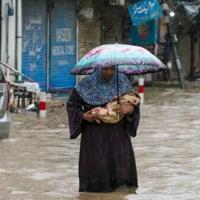Pakistan’s second-largest city of Lahore experienced a historic deluge of rainfall on Thursday, causing flooding in hospitals, power interruptions, and submerged streets in the metropolis.
The eastern city received nearly 360 millimetres (14 inches) of rain in a span of three hours, as reported by the Pakistan Meteorological Department (PMD).
“This rainfall broke records,” stated the agency’s deputy director Farooq Dar to AFP.
The previous record was set in July 1980, with 332 millimetres falling over the same time frame.
“Look at all these buckets and the collected water. We are exhausted from trying to drain it,” said Sadam, a 32-year-old shopkeeper, as he assessed his significant losses.
The PMD had predicted an above-average monsoon season for Pakistan this year, a country considered highly susceptible to extreme weather events linked to climate change.
Over the past three days, 24 individuals lost their lives due to rainfall in Khyber Pakhtunkhwa, the country’s mountainous northwestern province, according to the Provincial Disaster Management Authority.
In Lahore, a city with a population of 13 million, one person died from electrocution during Thursday’s heavy rain, as confirmed by local police.
The city’s commissioner declared a state of emergency and announced the closure of offices and schools for the day.
Yasir Ali, a 26-year-old resident, expressed deep sorrow over the situation, describing it as a “sad day for the nation”.
– ‘Pay some attention here’ –
Two government hospitals in Lahore reported ward flooding, along with intermittent power outages persisting into the afternoon.
Submerged roads led to halted traffic and business operations in the area.
Ahmed Khan, a 48-year-old daily wage earner, appealed to the government to address the water issue in the region.
Maryam Sharif, the chief minister of Punjab province, reassured the public that “the entire government machinery is actively working to drain the water”.
The summer monsoon season brings the majority of South Asia’s annual rainfall between June and September, crucial for agriculture; however, changing weather patterns due to climate change pose risks to lives and livelihoods.
Earlier this year, Pakistan faced heatwaves and unusually high rainfall, resulting in casualties and damages.
In neighboring India, heavy rains led to landslides in Kerala, claiming the lives of at least 160 individuals, mostly laborers and their families.
In 2022, unprecedented monsoon rains submerged a third of Pakistan, displacing millions and costing an estimated $30 billion, as per the World Bank.
kf-jts/rsc/js





